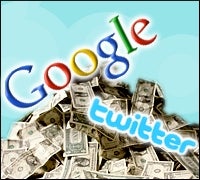 |
Regardless of whether reports are correct over whether Google is looking to buy Twitter, or merely to work with the microblogging site on a new search engine, industry watchers say that the world’s largest search provider needs to take some kind of action — lest it lose market share.
The thinking is that Google (NYSE: GOOG) may face the prospect of relinquishing some its market share to social networking sites, which are gradually making Internet-wide organic search less relevant as they help users find information through peers at these sites.
That conclusion only added fuel to the fire sparked when Michael Arrington of TechCrunch reported that the two companies were in serious talks about a Google acquisition, later dialing down the story to one focusing on Twitter and Google collaborating on a search engine. Since then, other reports refute reports of an acquisition.
Google had not responded to InternetNews.com‘s requests for comment by press time, while Twitter co-founder Biz Stone shied away from commenting on Arrington’s report.
Instead, Stone referring the press to his blog post on the subject: “My inbox is flooded this morning with requests for a response to the latest Internet speculation about where Twitter is headed. It should come as no surprise that Twitter engages in discussions with other companies regularly and on a variety of subjects.”
While it’s not clear what Google and Twitter may have been discussing, observers see the news a chance for Google to correct some oversights.
Two weeks ago, Pila Research analyst Richard Greenfield said Google has fumbled the ball in getting a foothold in social search — and as a result, the company could see its core business become less relevant as sites like Twitter “diminish the importance of search.”
Referring to the lukewarm results from an ad deal between MySpace and Google, Greenfield wrote in a March 17 report that “while everyone was blaming social networking as the culprit for Google’s MySpace monetization problems (meaning people are not thinking about ads when using social networks), the real problem is Google itself and its search algorithms for social networking (MySpace users that search for a person named Dan should not see DNA testing as the sponsored link).”
In the time since Google and MySpace signed their ad deal, “Google has done nothing to improve its social search algorithms,” Greenfield added. “Increasingly, it appears as though Google simply does not care about social search. In turn, it is harder to conceive Google paying anywhere near their prior commitments to MySpace, especially as the inherent functionality of social networks (status updates/news feeds, internal IM, internal e-mail) is diminishing the importance of search.”
As a result, it could certainly make sense that the search giant wants to shore up its footing by acquiring Twitter, or at least doing a deal to integrate its search capabilities into Google’s. Greenfield had not returned calls asking for comment by press time.
[cob:Special_Report]Meanwhile, Bernstein Research analyst Jeffrey Lindsay recently sent a sober warning to would-be suitors of Twitter, warning them not to buy a site with buzz that doesn’t make money.
In his report, “The Ruinous History of ‘Pre Business’ Internet Deals,” Lindsay wrote that Twitter is “un-monetizable” and that whoever buys it will likely operate it at a loss — forever. The reason is one that we’ve heard before: People want to connect on social networking sites, not click ads.
He goes on to advise any potential buyers to hang back and let Twitter’s creators attempt to come up with a viable business model. Lindsay did not return a request for additional comment by press time.
All of the speculation comes at a time when Twitter is indeed trying to come up with a business model, seeking to solve the same riddle facing a slew of online media plays since the Web’s start: How do you make money off of a wildly popular service that people have come to equate with free?
So far, it’s made only tentative steps in the direction of an answer. On March 26, Stone told InternetNews.com that the company is planning to roll out its first commercial product later this year, offering a premium tier of accounts to enterprises already using the free service.
Twitter’s certainly not alone, either. Social networking giant Facebook is working through the same dilemma as it tinkers with different advertising models and novelties like micropayments for virtual gifts. The acquisition bug also bit Facebook as well, having briefly engaged Twitter in merger talks until the deal broke down over price.


